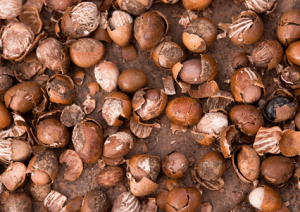Shea not supporting sustainable poverty reduction – Study
 A research by the Institute of Statistical, Social and Economic Research (ISSER) of the University of Ghana has suggested that the shea industry in its current form cannot be a means for sustainable poverty reduction as shea-nut pickers do not make meaningful profits.
A research by the Institute of Statistical, Social and Economic Research (ISSER) of the University of Ghana has suggested that the shea industry in its current form cannot be a means for sustainable poverty reduction as shea-nut pickers do not make meaningful profits.
The research, which was released at a workshop on agricultural cash crops and global trade, organised by ISSER in Tamale, said shea-nut pickers were able to pick approximately 2.5 bags per season, which cost GHc112.5, far below the country’s per capita income of 1,858 dollars.
It said there was need for government and all actors to commit resources into sustaining the shea sector to enable it to take advantage of the growing demand for shea in the confectionary and locally hand-made shea butter in the cosmetics industries.
It was conducted as part of a project dubbed: “Peasants Autonomy and Capture in Times of Increasing Integration of Global Food Markets” being implemented by ISSER and the Volkswagen Foundation, in collaboration with the Centre for Research Development, Germany since 2012.
It focused on shea-nuts, cashew and mango, which were important global trade commodities with long-term investment implications.
Dr Martha Awo, the Research Fellow at ISSER, who undertook the research, said the shea sector presented a highly unregulated and fragmented market structure, with uncoordinated activities, which did not augur well for its development.
Dr Awo, therefore, recommended a detailed sector analysis such as cost benefit analysis that would give a picture of the sector’s investment potential and its ability to support livelihoods and reduce poverty.
She said there was need for stronger collaboration and strengthening of public private partnership at the national level, as well as regional collaboration among shea producing nations in West Africa, to institute policies, uniform standards and harmonize the prices of shea across borders.
She called for strengthening of institutions such as the Shea Unit under COCOBOD, to work towards developing the sector.
She also called for the development of shea plantations as well as shea tree planting programmes in districts and communities to sustain the industry.
Dr Joshua Yidana, the Senior Lecturer at the Faculty of Agriculture at the Nyankpala Campus of the University for Development Studies, who made a presentation on “Shea tree propagation” recommended development of shea plantations to ensure sustainability of the shea fields to support rural poverty reduction.
Participants at the workshop, who were shea industry stakeholders and farmers from shea communities in northern Ghana, expressed the need for government to come out with a policy to revive the shea industry and make it attractive to its stakeholders especially shea-nut pickers.
Source: GNA
